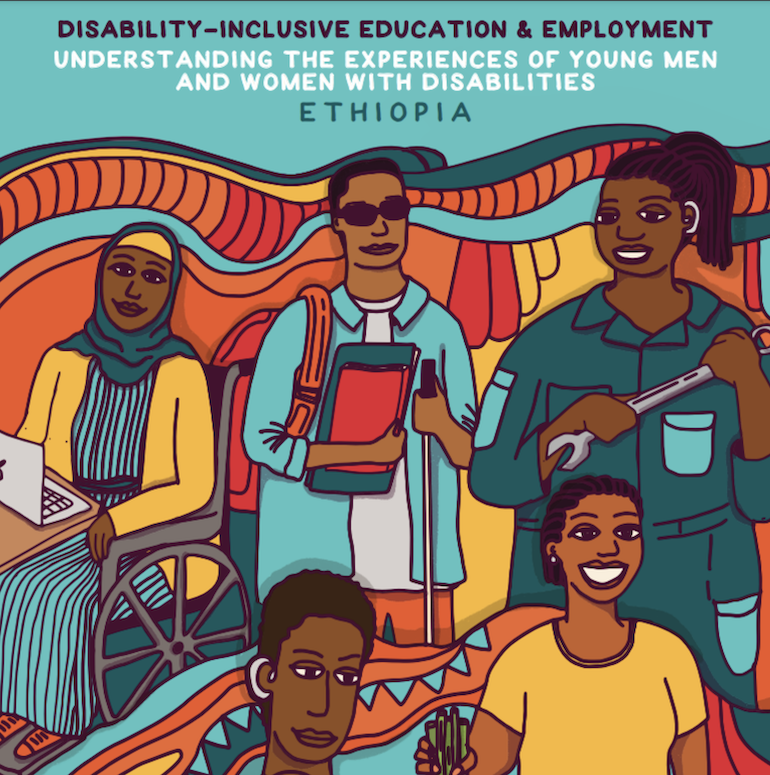
Disability-Inclusive Education and Employment: Understanding the Experiences of Young Men and Women with Disabilities – ETHIOPIA
Executive Summary
- This research explored the lived experiences of young men and women with disabilities in Ethiopia through in-depth interviews with 30 young persons with disabilities. The study included a mix of participants with various disabilities (including physical, visual, hearing, psychosocial, and intellectual impairments), aged between 15-35 years, based in urban and rural parts of Ethiopia. Participants were purposively selected to reflect varied access to education and vocational training, and employment in the agricultural and the manufacturing sectors.
- Participants reported navigating numerous barriers to accessing appropriate, inclusive schools including distance, a lack of accessible transportation, negative attitudes from family members, and the inability to meet the costs of education. These costs included school fees, books, uniforms, the opportunity cost of family members accompanying the students to school, assistive products, and inclusive learning materials and support.
- Experiences of youth with disabilities during education were shaped by inaccessibility, and a general lack of accommodations, as well as exclusionary teaching practices. Several young people did, however report the benefits of inclusive and enabling environments created by supportive teachers, staff, and peers, although these experiences were not consistent.
- Most young people with disabilities faced challenges securing employment, due to discriminatory hiring practices. Those in employment struggled with inaccessible workplaces and a lack of workplace accommodations. Many young people needed support to develop their capacity, employability, and skills to improve their chances in successfully transitioning into employment.
- Youth with disabilities in the agricultural sector were mostly working on family farms, generally due to exclusion from education and other career opportunities, lack of opportunity in rural areas, and challenges due to impairment rather than by choice. The data indicates that training and financial support could attract more youth with disabilities to engage with this sector.
- Youth engaged in the manufacturing sector reported challenges including limited opportunities, financial barriers, and difficulties gaining entry to trainings.
- Access to assistive products and to digital skills training were noted as facilitating factors in education and employment. Support from family members, friends, peers, and community members were also strong enablers of participation and attainment.
- Many youth participants had experienced stigma including negative attitudes and stereotypes, bullying, violence, and abuse, and discrimination and exclusion in education and employment settings. Drivers of stigma included lack of awareness of the capabilities of youth with disabilities, and misconceptions about disability.
- This study also explored the intersectionality of other factors with disability in shaping youth experiences. Young women with disabilities experienced compounded discrimination as both disability and gender carry unique forms of marginalisation and stigma. There were distinct differences in young people with disabilities experiences along urban and rural lines, and access to education, employment opportunities, assistive products, and to diagnostic services were harder for rural youth.
Disability-Inclusive Education and Employment: Understanding the experiences of young men and women with disabilities in Ethiopia 7 - The extent of voice and agency among the young people varied with the type and severity of impairment, household factors, and family dynamics. Participants reported being forced to attend schools that were not their first choice, working jobs out of obligation or necessity, and restrictions from parents around participation, job seeking, and routine life decisions.
- There was a discrepancy between what youth with disabilities aspired for, are confident doing, and the opportunities available to them.
- Recommendations include strengthening educational institutions and teachers to better deliver inclusive education; improved policy implementation to increase inclusiveness of persons with disabilities in education and employment; improving opportunities for young people with disabilities to access financial support for skills trainings, the job seeking process, and start-up capital for small businesses; more efforts to create awareness and sensitise employers and communities to address drivers of stigma; wider availability of assistive products and digital skills; and wider range of interventions and financial support options to better match the aspirations of young people with disabilities with opportunities
About the Series:
“Disability-Inclusive Education and Employment”
Recognizing that meaningful inclusion for young people with disabilities starts with listening and learning, the Mastercard Foundation developed a research program to map the policy landscape and to hear directly from young people with disabilities.
This research was carried out in partnership with the International Centre for Evidence in Disability at the London School of Hygiene & Tropical Medicine (LSHTM), the University of Abuja, the University of Ghana, Lifetime Consulting Ltd, Addis Ababa University, University of Nairobi, Global Advocacy and Research Group and MRC/UVRI & LSHTM Uganda Research Group.
Two report series have been developed, covering the Mastercard Foundation’s seven countries of focus – the first on the context, the second elevating youth voices.
Briefs summarizing the key findings of each report have been prepared by Dr. Xanthe Hunt in collaboration with LSHTM and the Mastercard Foundation’s research team.


